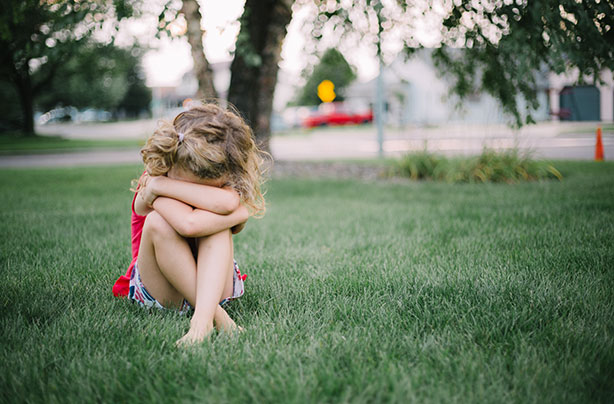NSPCC reveals the changes in a child's behaviour that can be indicators of sexual abuse
'Sudden, unexplained changes in the way children are acting can often be signs of abuse or bullying'

The NSPCC has released a statement explaining some of the most common indicators that a child has been a victim of abuse.
The discussion was sparked after a concerned mother posted a question about her daughter's behaviour on Mumsnet, saying that 'over the past month we have seen an alarming switch to "manic and aggressive" with intrusive thoughts.'
The mum went on to explain that her daughter had begun 'fidgeting constantly, running everywhere, talking nonsense, not listening or trailing off in the middle of sentences and beginning a new conversation,' adding that the young girl had also been unable to sleep, started displaying 'impulsive behaviour' and had become verbally and physically aggressive.
She added that the intrusive thoughts often referred to 'private parts' - 'essentially the growing realisation that everyone has them, and that she wants to look at everyone's all the time. Or saying that she is "thinking about private parts" all the time.
'She's asking us constantly if we are going to "tell on her" for every little infraction and believes the police/school are going to get her if she does anything wrong.'
These changes, coupled with regular violent outbursts and finding joy in recent tragedies such as the fire in London, have driven the worried parent to wonder if she should seek professional help for her child.

Many commenters agreed that she was not being unreasonable to be anxious, with one writing: 'Is there any chance she could be being abused by someone? Not suggesting that this is the case, but she reminds me of my cousin who was being abused and threatened by a family member.'
GoodtoKnow Newsletter
Parenting advice, hot topics, best buys and family finance tips delivered straight to your inbox.
Another agreed: 'Abuse is what sprung to mind for me too. For this behaviour to be so sudden suggests something has happened.'
Emily Cherry, Head of Participation at the NSPCC told The Independent: 'The way the parent describes their child's behaviour is a real cause for concern.
'Sudden, unexplained changes in the way children are acting can often be signs of abuse or bullying.
'Most children go through a phase, particularly in their early years, of becoming fixated on genitalia, and this can be a normal stage of development. But when that is combined with other really noticeable behaviour changes it can be an indication that some form of abuse has either happened or is happening.
'A particularly worrying sign is that the child is fearful of being told on to teachers and police. Abusers will use fear, shame and guilt to silence their victims and prevent them from speaking out.'
She also shared a list from the charity of signs that all parents should look out for if they are concerned about possible abuse, including:
- Aggressive mood swings (particularly in young children)
- Bed wetting/soiling themselves
- Urinary infections
- Eating disorders
- Problems sleeping
- Genital area soreness
- Using sexual language or information you have not talked with them about sex and relationships
- Becoming withdrawn
- Avoiding or becoming fearful of seeing particular people, places or situations
- Being aggressive
- Self harm and suicidal thoughts
In the case of the family in question, Emily suggests that they reach out to their GP and their child's school for support, although a referral to children's social services may also be necessary.
Any other parents who are worried about a sudden change in their child's behaviour can seek similar support, or call the NSPCC's counsellors on 0808 8005000.
Trusted, informative, and empathetic – GoodToKnow is the ultimate online destination for parents. At GoodtoKnow, our mission is 'simple': we're trying to make sense of parenthood. On the site, you'll find everything you need for a happy, healthy family life. Our huge archive of content includes more than 18,000 articles and 1,500 how-to videos. These include expert-backed advice features on parenting, dealing with relationship changes after having a baby, self-care for mums and managing your family finances. We also feature tried-and-tested product reviews and buying recommendations for every stage of family life - from prams and Moses baskets to birthday gifts and top toys.